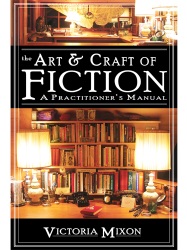I struggle with critiquers having a mind set of ‘just the facts’ style of writing, paring the story down to the bare bones, but maybe that’s not the writer’s ‘true style’ and the critters can’t see that, so even when the mss. is whittled down to its essence, there still seems to be something missing–it lacks life, character, voice, whatever you want to call it. Especially troubling to new writers who haven’t found their voice yet. My sense is that it takes that proverbial ‘million words’ to even begin to find one’s voice. If that’s true, I’m not even a fifth of the way home …so back to work. 🙂 —Chris
It sounds like you’ve got two problems going on at once, Chris.
One is that peer critiquers can’t really guide you in learning your craft. They don’t know any more about it than you do. So you really, seriously need to take their advice with a grain of salt. Half of it will be good, and half will be bad, and until you’re more accomplished than they are you can’t tell which is which. They more or less cancel each other out.
The advice to write in scenes rather than exposition is good advice, and there are important reasons for it. If there’s something missing when you whittle your ms down to its scenes, write more vivid scenes. Think up more intense events for those scenes—not violence, but internal struggle. And keep in mind that if you haven’t yet learned to detach from your work, you’ll assume just because your early drafts came out of you in one form that means they can’t live in any other form. They can, and they will.
Exposition is a tool in the writer’s toolbox, but it’s a tricky and, actually, not essential one. You need to get really good at writing scenes before you try to get really good with exposition. The one leads to the other.
The other problem is that it sounds like you’re struggling with voice and prose pretty early in the game. Don’t worry about it in first drafts or even at this stage in your writing life. Just write clean, clear sentences full of detail recording what you see your characters doing. Go out and take notes on the real world to practice seeing the details that are there. Go home and pay attention to your characters—make lists, draw diagrams, doodle their names all over your margins.
But don’t pressure yourself to develop a voice. As Christopher Isherwood said, just be a camera. All else flows from there.
“The freshest and
most relevant advice
you’ll find.”
—Helen Gallagher,
Seattle P-I
The Art & Craft of Story


